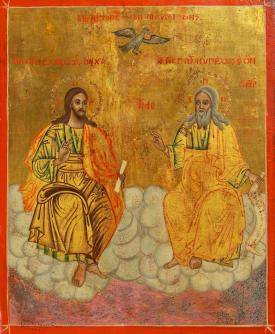When reflecting on the Holy Trinity, given the reality that it is as they say mysterium Trinitatis, I think it is best to recognize this doxological reality and allow that to shape the way the Christian wades into this  Holy of Holies. Epiphanius once wrote:
Holy of Holies. Epiphanius once wrote:
God is one, the Father in the Son, the Son in the Father with the Holy Spirit . . . true enhypostatic Father, and true enhypostatic Son, and true enhypostatic Holy Spirit, three Persons, one Godhead, one being, one glory, one God. In thinking of God you conceive of the Trinity, but without confusing in your mind the Father, the Son and the Holy Spirit. The Father is the Father, the Son is the Son, the Holy Spirit is the Holy Spirit, but there is no deviation in the Trinity from oneness and identity.[1]
When thinking the Trinity it is a constant, as Barth would say, dialectic between thinking the one and the many, the many and the one; the reality of unity and multiplicity, and multiplicity and unity; or oneness (De Deo uno) and threeness (De Deo trino), and threeness and oneness. To complicate matters even further, the discussion of how the perfections or attributes of God can be spoken of as one and many, many and one; particularly given the inseparability of God’s operations ad extra (opera trinitatis ad extra sunt indivisa) as those reflect the in se origins of relation (or processions) of God’s antecedent eternal life. Here we enter the locus that is typically identified as God’s simplicity. But it is good to remember, as Epiphianus does above, that to think of God’s so-called simplicity, this ought never be devoid of thinking this from the triunity of God. We can affirm, and should affirm, that God is non-composite in His inner life; but this does not, nor should not entail the notion that God’s oneness nor His threeness can be thought away from each other—they must always be thought into each other in the koinonial and co-inhering life of eternal and filial relationship that God was, is, and always will be. Barth attempts to tackle these things in this way:
The multiplicity, individuality and diversity of the perfections of God are those of His simple being, which is not therefore divided and then put together again. In God multiplicity, individuality and diversity do not stand in any contradiction to unity. Rather the very unity of His being consists in the multiplicity, individuality and diversity of His perfections, which since they are His are not capable of any dissolution of separation or non-identity, and which again since they are His are capable of genuine multiplicity, individuality and diversity. The plurality which is to be predicated of God can therefore, even in its multiplicity, because it is the multiplicity of God, signify only the unity. The unity which is to be predicated of God must with equal necessity, because it is in reference to God, signify the plurality. Every individual trait which is to be affirmed of God can signify only the one, but the one which is to be affirmed of Him must of necessity signify also every individual trait and the totality of all individual traits. Every distinction in God can be affirmed only in such a way as implies at the same time His unity and therefore the lack of essential discrepancy in what is distinguished. But again, it would not really be the unity of God if no distinctions were recognised and confessed. Our doctrine therefore means that every individual perfection in God is nothing but God Himself and therefore nothing but every other divine perfection. It means equally strictly on the other hand that God Himself is nothing other than each one of His perfections in its individuality, and that each individual perfection is identical with every other and with the fulness of them all.[2]
Indeed, Barth is at his best dialectical form as he discusses the Trinity; this passage is a perfect example of how he attempts to speak of God’s oneness in one movement, and then the threeness in the next key; and allow each chord of the Divine orchestra to play its note in concert again with the whole piece. This is the right way to think the Trinity in my view. We shouldn’t attempt to crack this nut; we must simply attempt to think along with its melodic reality and allow its res to usher us into the Holy place that it is. We see Barth doing this rather masterfully here; he attempts to hold the whole Monarxia together by simply engaging its whole reality in terms of emphasis here, emphasis there, and back again. Soli Deo Gloria!
[1] Epiphanius, Anc., 10, cited by T. F. Torrance, The Trinitarian Faith, 234-3.
[2] Karl Barth, Church Dogmatics II/1 §28 The Doctrine of God: Study Edition (London: T&T Clark, 2009), 78.
*repost, Trinity Sunday.
